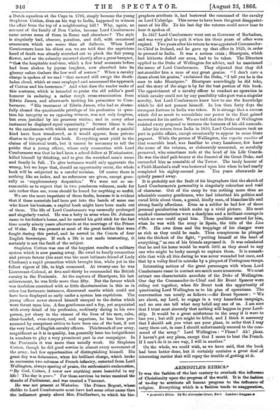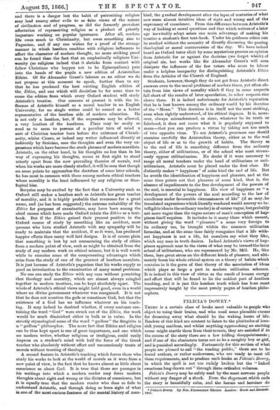ARISTOTLE'S ETRICS.*
IT was the 'fashion of 'the last century to overlook -the influence of Christianity upon the progress of the world. It is the fashion of te-dwer to attribute all human progress 'to the influence •of religion. Everything which is a fashion tends to exaggeration,
* Arisiolle's Ethics. By Sir A lexamtat ¢rw4 ears. lAiridoja; ,Lotiguis;4
and there is a danger lest the habit of patronizing religion may lead among other evils to as -false views of the nature of civilization and of progress, as did the formerly prevalent affectation of representing religion as a product of priestly imposture working on popular ignorance. After all, modern life owes much to Christianity, but owes something also to Paganism, and if any one wishes for a proof of the strange manner in which heathen combine with religious influences to affect the character 'of modern thought, no more striking proof can. be found than -the feet that an emphatically religious Uni- versity (so religious indeed that it shrinks from contact with fellow Christians who happen not to be Episcopalians) puts into the hands of the pupils a new edition of Aristotelian Ethics. Of Sir Alexander Grant's labours as an editor we do not propose at this moment -to speak, further than to say that he has produced the best existing English edition of the Ethics, and one which will doubtless be for some time to come the edition from which every Oxford student will -study Aristotle's treatise. Our concern at present is with the in- fluence of Aristotle himself as a moral teacher in an English University, for no single writer could be named as a better representative of the heathen side of modern education. He is not only a heathen, but, if the expression may be allowed, a very heathen of the heathens. Plato may be -easily so read as to seem to persons of a peculiar turn of mind a sort of Christian teacher born before the existence of Christi- -unity, whilst Cicero, or indeed any writer influenced directly or indirectly by Stoicism, uses the thoughts and even the very ex- pressions which have become the stock phrases of modern moralists. Aristotle, on the other hand, in his thoughts no less than in his way of expressing his thoughts, seems at first sight to stand utterly apart from the now prevailing theories of morals, and when his works are more closely studied, it will be seen that though on some points he approaches the doctrines of some later schools, lie has most in common with those among modern ethical teachers -whose morality is the least influenced by any religious or theo- logical bias.
Surprise may be excited by the'fact that a University such as Oxford still makes a heathen such as Aristotle her great teacher of morality, and it is highly probable that reverence for a great name, and (as has been suggested) the extreme suitability of the Ethics for purposes of examination, may have been among the chief causes which have made Oxford retain-the Ethics as a text- book. But if the Ethics gained their present position in -the Oxford course of study by something like an accident, most persons who have studied Aristotle with any sympathy will be ready to maintain that the accident, if so it were, has produced happier effects than many well laid designs. It is of course plain that something is lost by not commencing the study of ethics from a modern point of view, such as might be obtained from the study of any modern work on ethical science, but it is well worth while to examine some of the compensating advantages which arise from the study of one of the greatest of heathen moralists. It is just because of Aristotle's paganism that his works supply so good an introduction to the examination of many moral problems.
No one can study-the Ethics with any care -without -perceiving that theology -and morality, -which are almost always mingled together in modern treatises, can be kept absolutely apart. The whole of Aristotle's ethical views might hold good,-even in a world where no divine government whatever was recognized. It is not that he does not mention the gods or sometimes -God, but-that •the existence of a God has no influence whatever on his teach- ing. It may indeed be doubted whether, if every sentence con- taining the word -" God " were struck out of the Ethics, the work would be much diminished either in bulk or in value. In the strictly etymological sense of the word " godless' the Stagirite is a " godless " -philosopher. The mere fact that Ethics and religion can be thus kept apart is one of great importance, and one which -no modern writer, whether religious or irreligious, could really impress on a student's mind with half the force of the Greek -teacher who absolutely without effort and unconsciously -treats of morals -without treating of theology.
A second -feature-in Aristotle's teaching which forces those who study his works to look at the world of morals as it were from a new point of view, is the fact that he knows almost as little about conscience as about God. It is true that there are passages in Lis writings into which a modern reader may -force modern thoughts about right and -wrong or the dictates of conscience, -but it is equally true that -the modern reader who does so fails to understand Aristotle, and -through doing so loses sight of -what isone,af the most curious :features of the mentaLhistory_of man- kind, the gradual development after the lapse of centuries of what now seem -almost intuitive ideas of right -and wrong and •of the supremacy of conscience. From this. difference between Aristotle's way of looking at moral questions and that which writers of a later age inevitably adopt arises one -main advantage of making his treatise -a student's -first text-book. Under his guidance ethics can be studied without the necessity of directly discussing the passing theological or moral controversies of the day. We have indeed heard an Oxford tutor elicit by some-mysterious process an opinion from Aristotle for or against the doctrine (we forget which) of original sin, but works like Sir Alexander Grant's will soon dissipate the influence of the few tutors -who seem to labour under a helpless incapacity for distinguishing Aristotle's Ethics from the Articles of the Church of England.
Students, however, though they do net get from Aristotle direct answers even to the moral problems of modern times, yet often ob- tain from him views of morality which if they in some respects fall short of the results of later speculation, in other respects rise above them. It is indeed unfortunate for Aristotle's reputation that he is best known among the ordinary world by his doctrine of the "Mean." This doctrine is in itself not the most striking, even when rightly understood, of his ethical dogmas. It is, more- over, always misunderstood, as since, whatever be its truth or falsehood, it does not mean what it is popularly supposed to mean—that you can produce a virtue by taking not too -much of two opposite vices. To see Aristotle's greatness one should examine carefully the Aristotelian theory, either as to the -real object of life or as to the growth of habits. The -theory as to the end of life is something differeut from the ordinary theory, either of utilitarians, or of the school who most strenu- ously oppose utilitarianism. No doubt if it were necessary to range all moral teachers under the head of utilitarians or anti- utilitarians, Aristotle must be placed under the first class. He distinctly makes " happiness" of some kind the end of life. But he avoids the identification of happiness and pleasure, and at the same time points out that pleasure of some kind, that is, the absence of impediments to the free development of the powers of the soul, is essential to happiness. His view of happiness as " a development of the powers of the soul according to the law of excellence under favourable circumstances of life" -(if so may ,be translated expressions which literally rendered would convey-no in- telligible idea-to the ordinary reader) is of course vague, but probably not more vague than the vague nature of man's conception of hap- piness itself requires. It includes in it many ideas which cannot, without giving the word " pleasure" a sense very foreign to its ordinary use, be brought within the common utilitarian. formulas, and at the same time fairly recognises that a life with- out happiness is not a life, let moralists say -what they like, which any man in truth desires. Indeed Aristotle's views of hap- piness approach near to the views of -what may be termed thelater school of utilitarians, who are represented by Mr. Mill. He, 'like them, lays great stress -onthe different kinds Of pleasure, and ulti- mately bases -his whole ethical system on a -theory of habits which contains in it the germ of that theory of -the -association of -ideas -which plays so large a part in modern utilitarian schemes. It is indeed in this view of virtue -as the result of human energy and effort that will be found to lie the noblest part of heathen teaching, and it is just this heathen truth which has been most impressively -taught by the most purely pagan of heathen philo- sophers.































 Previous page
Previous page